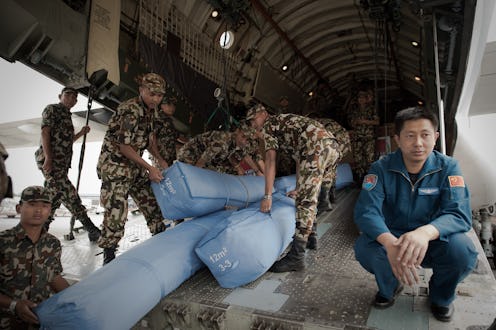News
Customs Delays Hamper Nepal Earthquake Relief
The United Nations has said that customs delays are impeding earthquake relief efforts in Nepal, with bureaucratic bottlenecks at the country’s only international airport holding up the delivery of aid materials to survivors. U.N. Resident Representative Jamie McGoldrick told Reuters Saturday that Nepal must loosen their customs regulations in order to cope with incoming relief packages and ensure their speedy delivery. The news comes a week after a 7.9 magnitude earthquake devastated the mountainous country. The death toll rose to 6,621 Saturday, as Nepal’s authorities ruled out finding any further survivors.
In the days since the quake hit, Nepal has made a customs exception for tarpaulins and tents — exempting such materials from import taxes on Friday, according to Reuters. The Guardian reports that hundreds of thousands of people were left homeless by the quake, while those living outside for fear that ongoing aftershocks might cause their dwellings to collapse have only recently begun moving back indoors. But while tent materials will offer some immediate relief, McGoldrick has criticized the limited extent of Nepal’s customs amendment. “They should not be using peacetime customs methodology,” he said, adding that other materials were piling up at Kathmandu airport.
The Nepalese government has not immediately responded to McGoldrick’s recommendation, but earlier official statements have made clear that the relief donation system is not hugely effective. Finance Minister Ram Sharan Mahat stipulated Friday that the country needed tents, tarpaulins and basic food supplies. Some donations, he suggested, were useless. “We have received things like tuna fish and mayonnaise,” he told reporters. “What good are those things for us? We need grains, salt and sugar.”
Reuters reports that U.S. military aircraft and personnel due to arrive Saturday would be involved in distributing the relief materials. “What you don't want to do is build up a mountain of supplies,” Brigadier General Paul Kennedy of the U.S. Marine Corps told the agency. Such stockpiles take up space that could be used for further supplies or aircraft, he said. Kennedy confirmed that six U.S. military aircraft, including two helicopters, plus 100 marines were expected in Nepal, in accordance with a bilateral agreement reached earlier in the week.
Relief, after a disaster that left more than 14,000 people injured, has been hampered by more than just customs delays. Trucks (and people qualified to drive them) have been in short supply, and the slow pace of aid-delivery to rural communities has frustrated many. “This is the first time someone has even come and asked us if we are okay,” Ghoma Lana, a resident of Melchour village (several hours from Kathmandu) told VICE News Friday. Lana’s daughter died instantly when their house collapsed. Bharat Shresta, a UNDP worker in nearby Chautara, told VICE that the people of the remote region felt they were being ignored in the wake of the earthquake. Shresta said the frustration had bubbled over recently:
Agni Sapkota, a constituent assembly member, came by helicopter to examine the situation and people started throwing stones at him and he needed to be rescued by the army.
As with the customs delay, the problem is not the lack of supplies, but the lack of efficient delivery methods. “Our granaries are full and we have ample food stock, but we are not able to transport supplies at a faster pace,” Shrimani Raj Khanal, a manager at the Nepal Food Corp, told Reuters. Although army helicopters have air-dropped basic goods (instant noodles and biscuits) to remote villages, the gesture is a little like putting a plaster on a gaping chest wound. “My friend got two packets of biscuits, and I just got one packet of noodles,” Naani Karki of Chautara told VICE.
In the village of Chhatrepati, residents told The Guardian they had received nothing by Saturday. “You are the first one to come here. Neither the government nor any aid agencies have looked after us,” Mohan Bahadur Thapa, 48, said. “We are cooking food in this open space for at least 23 people of my family… If they can’t give us any support, they could have come and at least ask and see how we are living.”
Food and housing are just two issues in a long list of problems post-earthquake Nepal faces, including health, water, sanitation and medical relief. The UN reports that 600,000 houses have been destroyed or damaged, while 8 million people have been affected by the quake. The outbreak of disease is now a major potential threat. Rownak Khan, UNICEF's deputy representative in Nepal, issued a statement that warned:
Hospitals are overflowing, water is scarce, bodies are still buried under the rubble and people are still sleeping in the open… This is a perfect breeding ground for diseases.
As officials focus on future phases of relief work, Nepal’s authorities have said they are not expecting to find any more survivors. “We are trying our best in rescue and relief work but now I don't think that there is any possibility of survivors,” Home Ministry spokesman Laxmi Prasad Dhakal told AFP Saturday. The country — one of the world’s poorest — has acknowledged that it was unprepared for the disaster, according to BBC, and has asked repeatedly for more foreign assistance.
Images: Getty Images (3)
